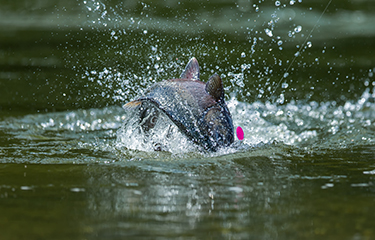The city of Bethel, Alaska, U.S.A., wants to join a federal lawsuit against NOAA Fisheries led by two major tribal organizations.
In April, the Association of Village Council Presidents (AVCP) and Tanana Chiefs Conference (TCC), which together represent around 100 Alaskan tribes, filed a lawsuit challenging NOAA Fisheries’ management of industrial trawl fisheries in the Bering Sea. The tribes, along with the nonprofit environmental law group Earthjustice, claim that the amount of salmon bycatch allowed in the pollock trawl fishery is reducing the king salmon and chum salmon populations, leading to restrictions on subsistence fishing in the Yukon and Kuskokwim regions.
“Fisheries managers are continuing to make decisions including annual catch limits based on severely outdated environmental analyses that do not consider the loss of sea ice, shifts in species distribution and abundance, salmon declines, seabird die-offs, and ecosystem-wide upheaval resulting from a rapidly changing climate,” Earthjustice attorney Kate Glover said. “Relying on such outdated studies is a violation of the National Environmental Policy Act.”
The lawsuit demands that federal fisheries managers reconsider their approach to the pollock trawl fishery in light of how it may impact subsistence salmon fishing. The suit claims that “the final 2023 and 2024 harvest specifications for groundfish in the Bering Sea and Aleutian Islands was arbitrary, capricious, and not in accordance with the National Environmental Policy Act” and asks the court to vacate those harvest specifications.
Now Bethel, a city of more than 6,000 residents along the Kuskokwim River, has asked the U.S. District Court for the District of Alaska for permission to join the federal lawsuit. The city council first voted to join the legal effort in May 2023.
“We are grateful that the City of Bethel is seeking to join us in this vitally important fight. Our way of life is being impacted here in Bethel and across the region,” AVCP Chief Executive Officer Vivian Korthuis said. “This lawsuit demands action which protects our way of life-past, present, and future.”
Alaskan salmon groups and tribal organizations have taken aim at the pollock trawling fishery, claiming that federal policies favor the industry over local fishing communities.
“We’ve seen multiple species of salmon dramatically decline on the Kuskokwim in recent decades, including chinook and chum salmon, both of which are caught as bycatch by the Bering Sea pollock trawl fleet,” Kuskokwim River Inter-Tribal Fish Commission Executive Director Kevin Whitworth said in May. “These declines are devastating for our communities and our ways of life, and they’re happening in part because marine managers at the North Pacific Fishery Management Council and NOAA Fisheries do not equitably consider our traditional foods or our Tribes when making decisions about pollock allocation. Revising these national standards may bring the change we need to see in fisheries management to protect our salmon and cultures.”
In response, the pollock industry claims that less than 10 percent of their chum salmon bycatch originated in western Alaska and that most of the salmon bycatch comes from foreign hatcheries.
Photo courtesy of Shutterstock/Martin Rudlof Photography







